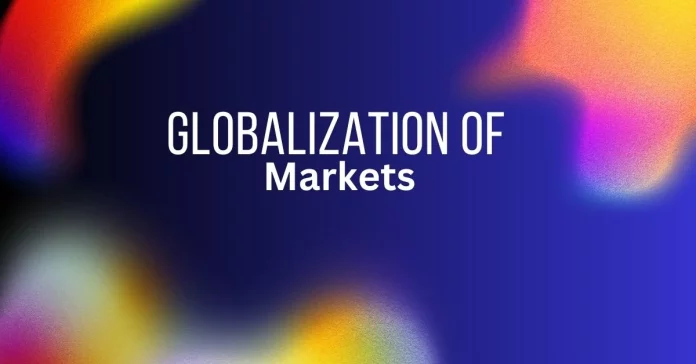CSS ESSAY 2022
Table of Contents
Thesis statement
The concept of Globalization of Markets has significantly influenced the global economy and international trade over the past few decades.
Introduction
Globalization refers to the integration of markets, economies, and societies across borders, leading to the emergence of a global economy. The concept of Globalization of Markets refers to the process by which businesses and consumers across the world become more interconnected and interdependent.
Exposition
A. Definition and Evolution of Globalization
Globalization has been an ongoing process for centuries, but its pace accelerated significantly in the second half of the 20th century due to advancements in technology, transportation, and communication. The fall of the Soviet Union and the rise of the internet as a means of communication and commerce further accelerated the process. Today, we live in a world where goods, services, and ideas can be exchanged more easily and quickly than ever before.
B. Characteristics of Globalization of Markets
The Globalization of Markets has been characterized by increased international trade, investment, and labor mobility. This has led to the emergence of global supply chains, where goods and services are produced in different countries and transported across borders. The Globalization of Markets has also been accompanied by the growth of multinational corporations, which have become major players in the global economy.
C. Drivers of Globalization of Markets
There are several drivers of the Globalization of Markets, including:
Technological advancements: Technology has made it easier and cheaper to communicate, transport goods, and conduct business across borders.
Liberalization of trade policies: Governments around the world have reduced trade barriers, making it easier to conduct international trade.
Increased mobility of labor and capital: Labor and capital can move more easily across borders, making it easier for businesses to access new markets and resources.
D. Positive effects of Globalization of Markets
The Globalization of Markets has had several positive effects, including:
Increased economic growth: The growth of international trade and investment has led to increased economic growth around the world.
Increased competition: The Globalization of Markets has led to increased competition, which has driven innovation and improved the quality of goods and services.
Improved access to goods and services: Consumers around the world have access to a wider variety of goods and services at lower prices.
E. Negative effects of Globalization of Markets
The Globalization of Markets has also had several negative effects, including:
Job losses and wage stagnation in developed countries: The growth of international trade and investment has led to the outsourcing of jobs in developed countries to developing countries with lower labor costs.
Exploitation of labor in developing countries: Multinational corporations may exploit labor in developing countries where labor laws and regulations are weaker.
Unequal distribution of benefits: The benefits of the Globalization of Markets have not been evenly distributed, with some countries and individuals benefiting more than others.
Description
A. Historical Overview of Globalization of Markets
The Globalization of Markets can be traced back to the European colonization of the Americas and the subsequent trade in goods such as sugar, tobacco, and cotton. In the 19th century, the Industrial Revolution led to the growth of international trade and investment. In the 20th century, the growth of multinational corporations and the fall of the Soviet Union further accelerated the Globalization of Markets.
B. The Role of Multinational Corporations
Multinational corporations have played a significant role in the Globalization of Markets, as they have been able to leverage their resources and expertise to enter new markets around the world. Many multinational corporations have become household names, such as Coca-Cola, Nike, and Apple.
C. Globalization of Markets in Different Regions
The Globalization of Markets has affected different regions of the world in different ways. In North America and Europe, the growth of multinational corporations and the outsourcing of jobs has led to job losses and wage stagnation, while in Asia and Latin America, the growth of multinational corporations has led to increased economic growth and the emergence of middle-class consumers.
In Africa, the impact of the Globalization of Markets has been mixed. While some countries have seen increased investment and economic growth, others have been left behind due to lack of infrastructure and political instability.
D. The Impact of Globalization on International Trade
The Globalization of Markets has led to significant changes in international trade patterns. The growth of global supply chains has led to increased trade in intermediate goods, which are goods used in the production of other goods. This has led to a more complex and interconnected global trading system.
E. The Future of Globalization of Markets
The future of the Globalization of Markets is uncertain, as there are several challenges that could slow down or reverse the process. These challenges include rising protectionism, political instability, and technological disruptions.
Conclusion
The Globalization of Markets has been an ongoing process for centuries, but its pace has accelerated significantly in recent decades due to technological advancements and liberalization of trade policies. While the Globalization of Markets has had several positive effects, including increased economic growth and improved access to goods and services, it has also had negative effects, such as job losses and exploitation of labor in developing countries. The impact of the Globalization of Markets has been different in different regions of the world, and the future of the process is uncertain due to several challenges.


